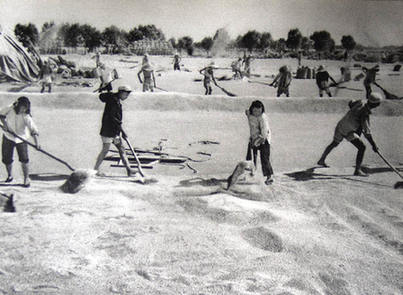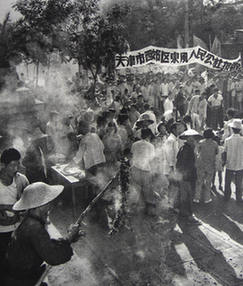People's commune
The people's commune (Chinese人民公社, Pinyin Rénmín gōngshè ) was a form of agricultural collectivization in the People's Republic of China.
History
After first agrarreformerischen approaches in the Jiangxi Soviet and the " liberated areas " in northern China (1 October 1949) was named after the founding of the People 's Republic of China, a land reform carried out in the " landlords " who had seldom more than 10 ha, the land was taken away and distributed among the " poor peasants ".
By 1955 there were first collectivization campaigns, at the same time the state took over the agricultural trade monopoly. In 1956, compounded the collectivization pace within the 3 Red Banner, among other things, all the property of the peasants went into collective ownership and the remuneration of farmers was carried out exclusively by the needs principle.
In connection with the announcement of the policy of the Great Leap Forward, there were 1957 establishing even larger production units, the people's communes. In all of China there were 24,000 people's communes, each comprising about 5,000 farming households, and had nothing to do with the traditional villages, but merged a number of villages. The workers were centrally managed and divided into work brigades that the had no more binding them familiar ground. The people's commune was supposed to replace the family as the smallest of the common cell. To this end, children and elderly were housed in community facilities and couples often separated for long periods. The accommodation and food was in bunkhouses and canteens, brought along household was allocated to the municipality. At the same time the people's communes formed the model for the organization to be set up next to the People's Liberation Army militia apparatus.
The policy of the Great Leap had the primary aim to industrialize the country within the shortest possible time. In this case, the people's communes should play a special role, it should make the industrial base of the country in " Volkshochöfen " through the production of steel in order later to supply the consumer industry. This bad planning as well as the lack of interest of the farmers in its activities led to a devastating famine in the years 1959 to 1961.
A major natural disaster in 1961 ended the Great Leap Forward. From 1962, therefore, the worst excesses of collectivization were withdrawn. Although the ground was collectively owned, but the farmers were grouped into production groups of about 20 to 30 families who organized their work and the income distributed. They worked about a quarter of the village area and presented by again some binding of the peasants to the land here. The people's communes lost their character as production units, they were now mere administrative units.
With the onset of economic liberalization policies under Deng Xiaoping after 1978 began also the end of the people's communes. In a first step 1978 Production contracts were concluded with households. To the ground among groups each comprising 5 to 6 family was divided; these had a certain quota of their production at a fixed price to deliver, but could otherwise organize their work freely. The surpluses could be sold so that the first free markets emerged. Already in the following year, 1980, these contracts were concluded not with the groups, but with the individual families. Has been committed to production contracts, which product had to be delivered, it became the 'blanket license agreements with the peasant households " to abandon the definition of production and any collective payment according to work points and instead left to the families to a piece of land for the use and them in order to transfer the risk of profit and loss.
In 1978, the people's communes were disbanded. They were renamed in communities or divided into several municipalities. While the ground is still formal collective ownership, de facto, however, is with the rights of use over 15 or more years, the trend clearly goes towards longer periods, and the toleration of sub- lease and sale of usage rights, as well as the construction of residential buildings a privatization carried out, which is interpreted by the farmers as well.










